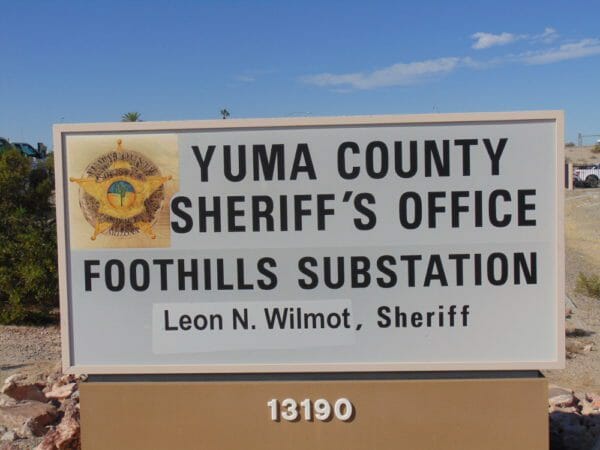
U.S.A. –-(AmmoLand.com)- In early November 2021, this correspondent was doing some target shooting and chronograph work on public land, in an unused sand and gravel pit with a good backstop, off a dirt track north of the Foothills/I8 interchange. The weather was clear and calm, about 72 degrees.
I had just fired my last shot when a Yuma County deputy pulled up behind my vehicle. It was about 0940. I put down the pistol I was shooting. It was suppressed. I waited for the deputy to advance about 50 feet. The pistol was in full view.
The deputy asked if I knew how far I was from houses, I said it was more than a quarter-mile. A quarter-mile distance from occupied dwellings is required to shoot on public land in Arizona. The deputy said that I was an adequate distance from any buildings.
I was carrying my old Glock17, concealed. He asked if I had a firearm on me. I said I did. He asked if I would please refrain from touching it while we talked. I said that was fine.
He indicated someone had called in about someone shooting in the area, and, while what I was doing was legal, I might consider changing the location or geometry a bit.
He asked for ID and I handed mine to him. It was my Arizona driver’s license, with the option of not having the Social Security number on it.
Was that necessary? Probably not. I believe you pick your battles and choose your ground. This ground was about legal shooting, not whether the deputy had the authority to demand to check my ID.
This correspondent has been in his shoes. I knew he was following protocol. It doesn’t hurt that I am known in the county. There have been other incidents where deputies have contacted me during Second Amendment activism.
He checked it out with dispatch. The acoustics were very good on his earpiece. I could not hear anything of the reply. He asked if I lived in the area. I said, yes, then corrected myself and said, I have a place in the area. I asked if he minded if I retrieved my target (25 yards away). He did not have a problem with that.
He reiterated that many people walk in the area, so I should be very careful. He said more winter visitors (snowbirds) were showing up, now that the weather was cooler. He mentioned there was traffic in the area, and I had to be sure of my backstop.
He recorded my information, made a mild suggestion that I orient to obtain a better backstop, and wished me a good day.
It was about 10:56 when we finished. He went back to his vehicle. I loaded up my vehicle. He backed up from blocking me in and drove off. I followed.
He did not ask for any permits. Arizona does not require permits. He immediately recognized I was acting legally, said so, and shifted to promoting firearms safety. He let me know we want to accommodate our winter visitors. (They support many local businesses.)
My suspicion is a winter visitor called. It has happened to this correspondent while open carrying. In a previous case, one deputy opined it was likely someone from Canada. With the current border restrictions, the Canadian possibility was less likely than other visitors.
Most states are not as free as Arizona. In some states, target shooting on public land is rigorously restricted. In other states, there is very little public land. Visitors from those areas are sometimes startled by the freedom we have in Arizona.
One interesting aspect of this encounter was that while I had all the paperwork necessary to prevent legal hassles, the deputy never asked about the suppressor on my pistol.
It would be an improvement to see Arizona emulate Texas with the silencer/suppressor law passed there in the last legislative session.
If Arizona would pass such a law, the deputy would be forbidden from any legal hassle about silencers/suppressors. They would be specifically protected.
The incident shows the importance of selecting sheriffs who are sensitive to Constitutional issues, especially Second Amendment rights.
Most contact with peace officers will be with local peace officers. If the local jurisdiction is administered by peace officers who are Constitutionally sensitive, the chances of problems with exercising your rights are much less likely.
Knowledge of the local laws is useful in preventing problems with deputies and other peace officers.
The Internet makes information about local laws fairly easy to find.
About Dean Weingarten:
Dean Weingarten has been a peace officer, a military officer, was on the University of Wisconsin Pistol Team for four years, and was first certified to teach firearms safety in 1973. He taught the Arizona concealed carry course for fifteen years until the goal of Constitutional Carry was attained. He has degrees in meteorology and mining engineering, and retired from the Department of Defense after a 30 year career in Army Research, Development, Testing, and Evaluation.

from https://ift.tt/3HtwlJx
via IFTTT

No comments:
Post a Comment